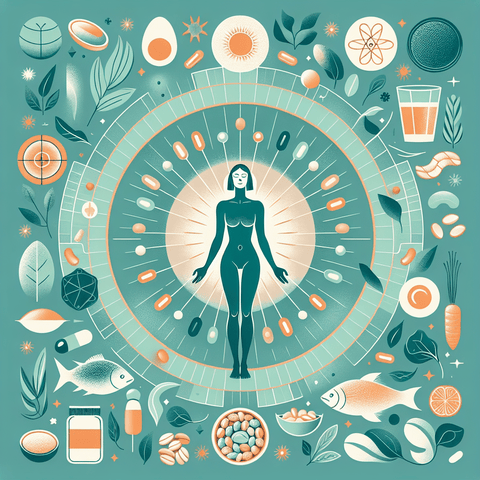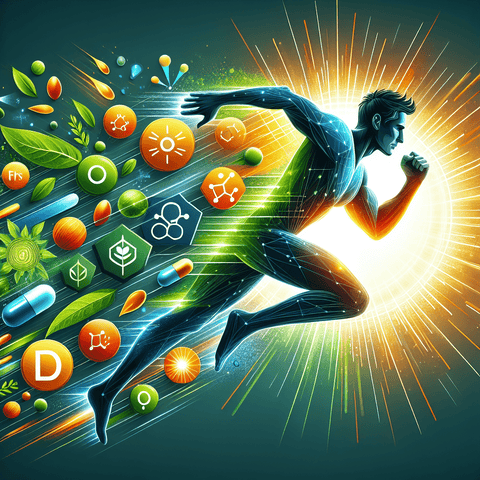Introduction
Fatigue is a common experience that affects individuals from all walks of life. Whether it's due to poor sleep, chronic illness, stress, or poor nutrition, feeling constantly tired can seriously disrupt quality of life and productivity. While occasional tiredness is natural, persistent fatigue may signify an underlying health issue — particularly a nutrient deficiency.
Among the many possible causes of fatigue, vitamin and mineral deficiencies are more common than many realize. These nutritional gaps may hinder your body's ability to produce energy effectively, leaving you feeling weak, mentally foggy, and less resilient during the day. Often, people overlook the impact of an imbalanced or insufficient diet on daily energy levels and overall vitality.
This article aims to explore the connection between tiredness and nutritional deficiencies, specifically focusing on the vitamins and minerals that play a vital role in energy metabolism. By understanding the signs, symptoms, and corrective strategies for these deficiencies, you'll be better equipped to address the root causes of your fatigue and support your health with targeted, personalized nutrition.
Vitamin Deficiency and Its Role in Fatigue
Vitamins are essential micronutrients that help your body perform a range of biological functions, including energy production, hormone synthesis, and immune support. When you're experiencing constant tiredness, a lack of certain vitamins may be the culprit. Among the most common vitamin deficiencies associated with fatigue are Vitamin B12, Vitamin D, and Iron, which though a mineral, is commonly grouped due to its significant impact on energy levels.
Vitamin B12 is critical for red blood cell formation, neurological function, and DNA synthesis. A deficiency in B12 can lead to megaloblastic anemia — a condition that reduces the oxygen-carrying capacity of your blood, leading to feelings of exhaustion, muscle weakness, pale skin, and cognitive disturbances like brain fog.
Vitamin D, often known as the "sunshine vitamin", influences energy levels through its role in immune function, bone metabolism, and, indirectly, mood regulation. Research has shown a correlation between low Vitamin D levels and chronic fatigue, especially in regions with limited sunlight exposure. If you spend little time outdoors or use high-SPF sunscreen daily, you may be at risk of deficiency.
Iron supports oxygen transport via hemoglobin in red blood cells. Iron deficiency is one of the most well-known causes of fatigue. Symptoms include weakness, rapid heart rate, dizziness, and even shortness of breath during mild exertion. Iron is particularly essential for menstruating women, athletes, and vegans who may not consume or absorb enough through plant-based sources alone.
The symptoms of these deficiencies often overlap, making it critical to undergo proper medical evaluation before starting supplementation. Blood tests like serum ferritin, Vitamin B12 levels, complete blood count (CBC), and 25-hydroxyvitamin D can help identify underlying causes of fatigue.
Addressing these vitamin deficiencies improves energy by optimizing cellular function, supporting red blood cell production, and enhancing mitochondrial efficiency. Recovery through food, lifestyle adjustments, and high-quality supplements, such as those available at Topvitamine’s Vitamin D range, plays a central role in regaining your energy and preventing recurrent fatigue.
Nutritional Deficiencies Contributing to Fatigue
In addition to vitamins, other macro and micronutrients profoundly impact your energy levels. Among the most significant contributors to fatigue are deficiencies in Iron, Vitamin B12, and Folate. These nutrients are essential for red blood cell formation and oxygen delivery throughout the body. When any of them is deficient, energy production drops, and fatigue sets in — sometimes severely.
Folate, or Vitamin B9, is critical for DNA synthesis and cell division. Like Vitamin B12, folate deficiency can cause megaloblastic anemia. This form of anemia results in large, immature red blood cells that are inefficient at oxygenating the body. The hallmark symptoms include persistent fatigue, irritability, headaches, and difficulty concentrating.
The interplay between Iron, B12, and Folate in the production of healthy blood cells cannot be overstated. Even a mild deficiency in one of these nutrients can impair energy delivery to organs and tissues — a common underlying issue in people who experience 'tired all the time' syndrome.
Diet plays a pivotal role in maintaining optimal levels of these nutrients. Rich sources of Iron include red meats, liver, shellfish, lentils, and spinach. Vitamin B12 is naturally found in animal products like meat, fish, eggs, and dairy, which can pose a challenge for those on vegetarian or vegan diets. Folate is abundant in leafy greens, legumes, citrus fruits, and fortified cereals.
In cases where dietary intake falls short or absorption is impeded (as in pernicious anemia, celiac disease, or chronic inflammation), supplementation may be necessary. A blood test will help guide the correct dosage and type of supplement. For a convenient and evidence-based solution, consider browsing Topvitamine’s Vitamin C and energy support selection. These products are designed to complement daily nutritional intake and enhance vitality naturally.
Correcting these nutritional deficiencies not only alleviates tiredness but also supports immune function, cognitive performance, and hormonal balance. The body is a sophisticated system, and small gaps in nutrition can lead to substantial declines in health and energy.
Fatigue Causes: Beyond Nutrition—Hormonal and Chronic Factors
While vitamin and mineral deficiencies are significant contributors to tiredness, they are not the only culprits. Hormonal imbalances and chronic health conditions can also result in persistent fatigue, often compounding the effects of nutritional gaps. Understanding these underlying causes is imperative when dietary improvements and supplementation fail to produce meaningful results.
Thyroid dysfunction is one of the most common non-nutritional causes of fatigue. The thyroid gland regulates metabolism — the process by which your body converts food into energy. In hypothyroidism (underactive thyroid), metabolism slows, resulting in fatigue, weight gain, constipation, cold intolerance, and depression. Hashimoto's thyroiditis, an autoimmune condition, is the most common cause of hypothyroidism and often goes undiagnosed for years.
Adrenal fatigue is a controversial but frequently debated condition that describes a state where prolonged stress exhausts the adrenal glands, leading to lowered production of cortisol and other stress-related hormones. Symptoms include waking up tired despite adequate sleep, mid-day crashes, reliance on caffeine, and an overall sense of burnout.
Chronic stress, whether physical or emotional, has profound physiological effects. It depletes essential nutrients, disrupts hormonal cascades, and erodes mitochondrial efficiency. This is particularly evident in high-pressure professions and caregiving roles, where emotional resilience is continuously tested.
Additionally, chronic infections and inflammatory conditions, such as Lyme disease, Epstein-Barr Virus (EBV), and autoimmune disorders, can trigger long-term fatigue. These conditions elevate inflammatory cytokines and divert energy from typical bodily functions toward immune defenses, leaving you feeling drained and lethargic.
In many of these chronic or hormonal cases, nutritional deficiencies exist concurrently. For example, hypothyroidism is associated with low Vitamin D, Selenium, and Iron levels. Supplementing without addressing the root hormonal imbalance may only provide temporary relief. It is crucial to work with healthcare professionals for a full assessment — including hormone panels, inflammatory markers, and micronutrient testing.
When underlying conditions are identified, a combined approach involving lifestyle changes, medical treatment, and nutritional supplementation (including targeted Magnesium products from Topvitamine) can significantly improve energy and quality of life.
Micronutrient Gaps That Lead to Tiredness
Beyond the commonly discussed nutrients, other less obvious micronutrients support hundreds of enzymatic reactions essential for energy production. Deficiencies in these micronutrients often go unnoticed but can significantly impair vitality. These include Magnesium, Riboflavin (Vitamin B2), and Selenium — each playing a unique role in mitochondrial energy metabolism.
Magnesium is involved in over 300 biochemical reactions in the body, including the synthesis of ATP — the primary energy molecule. Without sufficient magnesium, your cells struggle to generate energy, leading to fatigue, muscle cramps, insomnia, and high stress. Magnesium deficiency is widespread, especially in people who consume highly processed diets or experience chronic stress. Consider exploring Topvitamine’s Magnesium Collection to support muscular and metabolic energy production.
Riboflavin (Vitamin B2) plays a crucial role in the electron transport chain, a series of reactions in mitochondria that convert nutrients into ATP. It also helps recycle other B vitamins like B6 and Niacin, amplifying the body’s ability to create clean, sustainable energy. Deficiency in Riboflavin can cause cracked lips, inflamed tongue, weakened immune response, and overwhelming fatigue.
Selenium is a trace mineral that functions as an antioxidant, protecting cells from oxidative damage. It enables proper thyroid hormone metabolism by aiding the conversion of T4 to the more active T3 hormone. Low selenium levels can indirectly contribute to sluggish thyroid activity, compounding fatigue issues.
Identifying these micronutrient gaps requires comprehensive blood testing, since symptoms may mimic other conditions or exist sub-clinically without overt signs. Functional medicine often employs intracellular nutrient testing to assess these subtle deficiencies.
Including a varied diet rich in seeds, nuts, fish, leafy greens, organ meats, and dairy can help maintain optimal levels. However, in cases of long-standing deficiency, targeted supplementation may be required. Supplements enriched with such micronutrients are available from reputable sources like Topvitamine, which offers high-quality formulations backed by scientific evidence and regulatory compliance.
Maintaining nutrient adequacy across the board is essential for cellular energy maintenance. The solution to fatigue often lies in identifying and correcting the "missing piece" within your nutritional puzzle.
Tiredness Remedies: Nutritional and Lifestyle Approaches
Managing fatigue often requires a multi-dimensional approach. While supplementation is helpful, the foundation for lasting energy lies in a nutrient-dense diet, consistent lifestyle habits, and stress reduction. Here’s a deeper look at the synergistic approaches to fighting tiredness naturally.
Dietary adjustments play a central role. Include iron-rich foods like lentils, red meats, and leafy greens. Combine iron sources with Vitamin C-rich foods like citrus or bell peppers to enhance absorption. For vegetarians, fortified cereals and legumes are key. Incorporating fatty fish, eggs, and fortified products maintains adequate Vitamin D and B12 status when exposure or dietary sources are insufficient.
Targeted Supplements: Depending on your test results, focus on gap-specific nutrients. Consider a B-complex supplement to cover multiple energy-producing vitamins or a standalone formula for identified deficiencies. For example, you can find high-potency options to meet your needs through trusted retailers like Topvitamine’s Omega-3 and DHA/EPA products, which also support cardiovascular and brain energy.
In addition to diet and supplements, your lifestyle choices profoundly influence energy production:
- Sleep: Aim for 7-9 hours of quality sleep. Avoid screens 1 hour before bed and establish a consistent sleep routine.
- Hydration: Dehydration causes early onset of fatigue. Consume 1.5–2L of water daily, more if active or exposed to heat.
- Exercise: Moderate activity increases circulation, improves sleep, and boosts energy. Walking, swimming, and yoga are great options for beginners.
- Stress management: Chronic stress depletes B vitamins, magnesium, and zinc. Use mindfulness, meditation, or adaptogens to support adrenal health.
Combining these interventions encourages better mitochondrial function and nutrient synergy. As your nutrient reserves rebuild and inflammation subsides, you will likely experience brighter moods, better focus, and increased stamina.
Food-first strategies supplemented by trustable formulations from stores like Topvitamine represent a safe, effective, and sustainable path to long-term vitality. Remember, consistency is key to change.
Nutrient Imbalance and How It Causes Fatigue
While individual deficiencies may cause tiredness, nutrient imbalances — where some nutrients are in excess and others insufficient — can also disrupt energy production. Vitamins and minerals don’t exist in isolation; they function in tightly regulated networks, and imbalance among them compromises metabolic efficiency.
Take the relationship between Calcium and Magnesium. These minerals compete for absorption and regulate muscular and nervous function. Too much calcium and not enough magnesium can result in neuromuscular irritability, cramps, and persistent tiredness.
Another example involves Zinc and Copper. These two minerals influence enzyme functions and immune health. An imbalance may weaken immunity and lower energy. High zinc levels can deplete copper, while excessive copper may impair zinc function — resulting in fatigue, mood changes, and poor recovery.
Folate and B12 must also be balanced: excess folic acid in the presence of low B12 may mask B12 deficiency — potentially worsening neurological problems and tiredness.
Supplements can sometimes exacerbate these imbalances when taken without adequate testing or professional guidance. This is why personalized nutrition programs and professional-quality supplements from credible sources are essential. The goal isn’t just to raise levels but to harmonize them.
Correcting imbalances often requires moderate doses, spaced reforms in diet, and attention to co-factor nutrients essential for metabolic pathways. For example, Magnesium supplements may improve Vitamin D utilization, while Selenium helps activate thyroid hormones.
Balance is also crucial in digestive health. Iron, while vital, can cause oxidative stress or constipation if taken inappropriately. Likewise, fat-soluble vitamins (A, D, E, K) need healthy fats for absorption.
In summary, balance and bioavailability are central to ending fatigue. Comprehensive micronutrient testing and high-quality, balanced formulas, like those offered by Topvitamine’s Vitamin K lineup, empower you to manage fatigue with scientific precision.
Conclusion
Fatigue is more than a fleeting annoyance — it can be a signal that something is missing from your body’s complex energy-making machinery. Nutrient deficiencies, especially in Vitamin B12, Vitamin D, Iron, Magnesium, and Folate, are among the leading, yet often overlooked, contributors to persistent tiredness.
Identifying and correcting these gaps with nutrient-rich foods, targeted supplements, and lifestyle optimizations can dramatically improve your daily energy levels. But fatigue can also stem from hormonal imbalances, chronic illness, or nutrient interactions — complexities that make personalized nutrition planning essential.
If you consistently feel tired despite following healthy routines, it may be time for comprehensive blood work to identify less-obvious deficiencies and imbalances. Working with a healthcare provider and leveraging expert-tested supplements from trusted sources like Topvitamine.com can empower you to restore energy and well-being.
Now is the moment to take control of your energy and elevate your vitality—consider how optimized nutrition can transform your tired days into vibrant, productive ones. Shop our full range of expertly-formulated supplements at Topvitamine today.
Q&A Section
What vitamin deficiency causes fatigue the most?
Vitamin B12 is one of the most common deficiencies linked to severe fatigue, especially due to its role in red blood cell production and neurological function.
Can low Vitamin D make you tired?
Yes, insufficient levels of Vitamin D are associated with fatigue, especially in individuals with limited sun exposure or underlying inflammatory conditions.
Is Iron deficiency a cause of tiredness?
Absolutely. Iron-deficiency anemia is a well-recognized cause of fatigue due to its effect on oxygen transport throughout the body.
What should I eat to boost my energy naturally?
Focus on lean proteins, leafy greens, legumes, whole grains, and foods rich in B vitamins, iron, and healthy fats (like DHA/EPA from fish oil).
Where can I buy supplements for energy and fatigue?
You can explore scientifically-backed and EU-compliant products on Topvitamine.com, including specialized collections for energy and immunity.
Important Keywords
- Vitamin deficiency fatigue
- What vitamin is lacking when you're tired
- Vitamin B12 low energy
- Iron deficiency tiredness
- Magnesium for energy
- Vitamin D low energy
- Fatigue vitamin supplements
- Best supplements for fatigue
- Nutrient imbalance fatigue
- Topvitamine energy supplements



